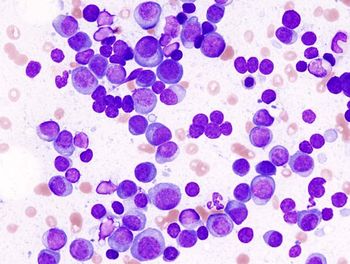
Circulating tumor DNA should be utilized early to help detect relapse in patients with triple-negative breast cancer.

Your AI-Trained Oncology Knowledge Connection!


Circulating tumor DNA should be utilized early to help detect relapse in patients with triple-negative breast cancer.

A phase 2 trial did not find a significant benefit to progression-free survival with regorafenib in patients with advanced or metastatic chrodoma.

Patients with advanced non–small cell lung cancer receiving sitravatinib plus nivolumab combination had promising objective responses during a post-hoc analysis of a phase 2 trial.

Previously treated patients with HLA-A*02:01-positive metastatic uveal melanoma saw survival prediction improvements with ctDNA when compared to RECIST 1.1.

Daily poziotinib in patients with untreated HER2 exon 20-mutant non-small cell lung cancer resulted in tumor reduction.

Results of 2 studies presented at 2021 ESMO demonstrate superior efficacy of sintilimab plus chemotherapy versus chemotherapy alone in certain gastrointestinal cancers.

Patients with EGFR-mutated non–small cell lung cancer who were treated with ado-trastuzumab emtansine and osimertinib experienced minimal anti-tumor outcomes.

A progression-free survival advantage persisted at the 3-year mark with venetoclax plus obinutuzumab in patients with previously untreated chronic lymphocytic leukemia.

The investigational BCMA-directed CAR T-cell therapy sustained durable responses for heavily pretreated patients with relapsed/refractory multiple myeloma.

Updated data from the pivotal L-MIND trial that were presented at the 2021 ASCO Annual Meeting continue to support the use of tafasitamab-cxix in patients with relapsed/refractory diffuse large B-cell lymphoma.

Palbociclib plus fulvestrant maintained a clinically meaningful overall survival improvement compared to placebo plus fulvestrant after a median follow-up of 73.3 months in patients with HR-positive, HER2-negative advanced breast cancer.

TAS-117 showed limited clinical efficacy in treating patients with ovarian cancer harboring PIK3CA E545K mutations and in those with breast cancer harboring PIK3CA H1047R and Akt1E17K mutations.

Investigational agent belzutifan plus cabozantinib was able to control tumor growth in most patients with advanced clear cell renal cell carcinoma in a phase 2 trial.

Treatment with momelotinib improved overall survival and sustained efficacy outcomes in patients with intermediate- or high-risk myelofibrosis.

Based on these data, researchers indicated that adjuvant osimertinib would be an effective and practice-changing treatment in this setting.

Women who present with a new diagnosis of breast cancer already in stage IV should not be offered surgery and radiation for the primary breast tumor with the expectation of a survival benefit, according to results from the ECOG-ACRIN E2108 trial.